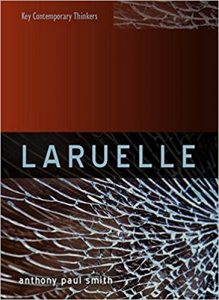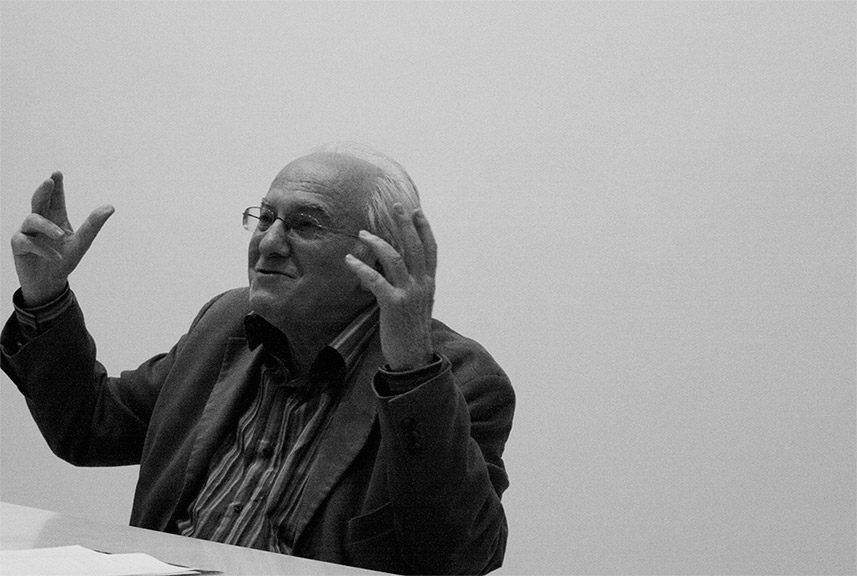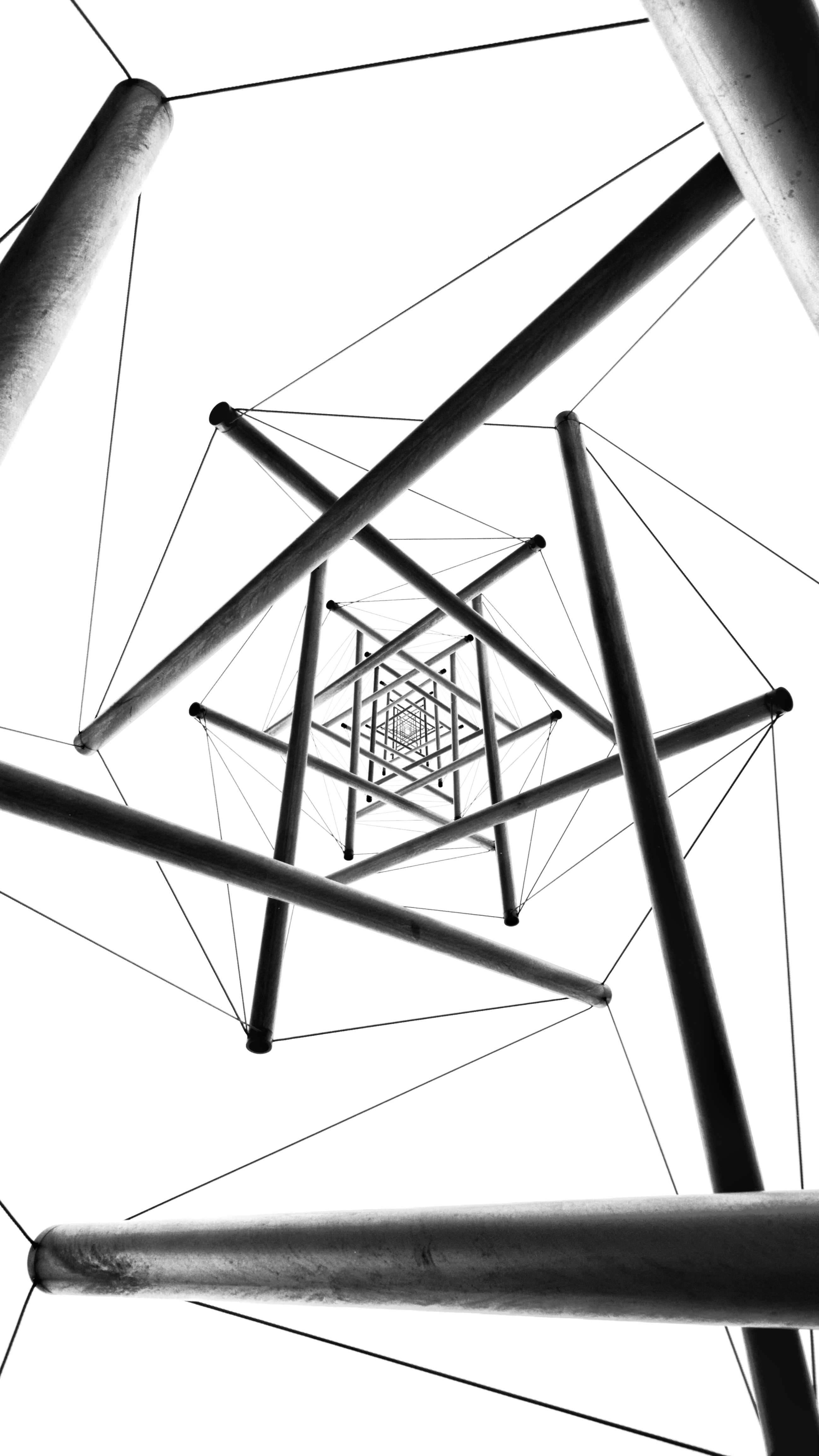Smith, Anthony Paul. Laruelle: A Stranger Thought. Cambridge: Polity, 2016. ISBN-10: 0745671233. Hardcover, paperback, e-book. 240 pages.
The reception of François Laruelle’s work in the Anglophone world is the classic case of the outsider, shunned for years after being confined to the margins of his discipline, eventually being recognized for his genius and being heralded as the ‘next big thing’ in philosophy. Laruelle’s work came to prominence mainly through association with the constellation of disciplines that includes Speculative Realism, Accelerationism and new reconfigurations of nihilism and pessimism — a constellation that has become in-vogue of late, arguably for its various conjugations with popular culture, whether that be the TV show True Detective, black metal music or internet-based horror fiction. The figures of the outsider, the stranger, the inhuman, the black and uncaring universe and mystical darkness that populate Laruelle’s thought fit neatly into this mainstream of radical theory and it is there that, for the most part, he has stayed.
A Stranger Thought is a welcome interjection into Laruelle studies that provides the reader with a cogent and well-balanced introduction to what is, as attested to in the subtitle to the book, one of the most unusual and potentially bewildering thoughts in contemporary philosophy. Anthony Paul Smith, an established Laruelle translator, is well-suited to be our guide through Laruelle’s strange oeuvre. But further to this it is a re-situation of Laruelle as something other than this aforementioned “Anglo-Pessimist” constellation. Smith, not unfairly, pulls focus to Laruelle’s inherent gnosticism and commitment to radical immanence and continues his alignment of Laurelle with critical race theory, a project also taken up by the book’s dedicatee Daniel Colucciello Barber. As such, one of the first tasks that Smith undertakes is that of defending Laruelle from criticism by Ray Brassier, who argues that Laruelle’s project is ultimately fruitless. Smith writes:
Detractors and even early adaptors [sic] have sat in judgment upon Laruelle’s project and called it fruitless. I embrace this fruitlessness, unlike these detractors, as a kind of anti-natalism regarding philosophy (though likely not an anti-natalism regarding human beings), precisely because it may join with projects on the fringes of institutional philosophy and theory more generally. (8)
As such, Smith reroutes this negativity against itself and argues that this naive-pessimist reading of Laruelle is merely superficial, and that while Laurelle’s project is undeniably one of negation and subtraction, it is not merely in the service of nihilism and that there is, in fact, a kind of vitalist core to Laruelle that would be anathema to his primary interlocutors, had they located it.
The book is divided into two sections, the former detailing the generic methodology of non-philosophy while the second considers various materials that this methodology is enacted upon. The opening chapter pertains to the first of Laruelle’s concepts addressed by Smith, that of the philosophical decision. In delineating this idea, Smith must first explicate the idea of the generic, as this is the very logical device deployed by Laruelle upon philosophy and philosophical decision that Smith uses to introduce us to Laruelle’s thought.
In short, Smith performs in this book, or at least moves towards, a kind of generic thinking Laruelle that renders visible the fundamental mechanism of the non-philosophical or non-standard methodology. Not only is this an elucidation of a key Laruellean concept, also a good, convenient approach by way of a means to introduction.
Any decision taken within philosophy is always conditioned by and subject to philosophy itself, or an invariant structure of philosophical thinking. Smith, true to his background in theology, frames this idea in terms of faith. Philosophy has a faith in itself and as such a kind of sufficiency, “much like some religious communities look to scriptures or dogmas as having sufficiency in their discourse of truth”(15). Laruelle performs a “diagnostic of philosophy,” in order to disempower it, make philosophy insufficient much as an atheist would look at Christianity and deny its particular claims to truth. “Non-Philosophy is in this way a kind of sobering up from philosophical drunkenness and its attendant harassment of the Real.”
Smith then begins to enact the polemical aspect of this book, that of resituating Laruelle
Here we come to an element of non-philosophy not often acknowledged in its early Anglophone reception — and when it was acknowledged it was often denigrated. For what underlies all philosophical decisions, claims Laruelle, is the human in its finitude and radical immanence. This is the abyssal ground of all philosophy for Laruelle: the human. (17)
The second chapter is devoted to the idiosyncratic style of non-philosophy and proceeds by a series of definitions of concepts peculiar to Laruelle: thinking-in-One, determination-in-the-last-instance, unilateral duality, force-(of)-thought, and a discussion of the grammar deployed, specifically the hyphen and operators such as ‘in.’ This restructuring of grammar speaks to Laruelle’s project of constructing that which is a stranger to philosophy and restructuring philosophical thought itself.
Further, it is an enactment of his commitment to immanence such that all transcendence must be expurgated from the very language of Laruelle’s texts — a phrase such as “force-(of)-thought” is hyphenated as to imply the immanence of both halves of the expression and the ‘of’ bracketed so as to affirm that the former has no priority over the latter. Smith writes: “This [use of language] is part of what makes [Laruelle’s] thought so strange. What makes someone a stranger is not a totally unrecognizable nature, but a commonality that yet does not quite fit into one’s own framework for making sense of a certain field of experience” (49).
Having established a kind of generic identity of Laruelle’s thought, in the second part of the book Smith then moves thematically rather than programmatically through Laruelle’s oeuvre and his treatment of various fields of experience; Laruelle seems to write only on a single topic at a time, so he can be said to have a book each devoted to politics, epistemology, ethics, methodology, religion and so on. However this is not to say that each book is self-enclosed, but rather that Laruelle starts from nothing with a certain set of material to which he performs the enterprise of non-philosophy. Smith turns to each of these issues in turn and delineates Laruelle’s engagement with them, cementing A Stranger Thought’s usefulness as a reference text and concise catalogue of Laruelle’s thinking.
What is striking here is the logic of the philosophical decision and the generic is employed in more or less the same way across each topic such that one can almost predict the outcome, like a recipe: firstly, form a generic identity of the area of philosophy that is to be disempowered, consider it in relation to a radical immanence that functions independently of it, use the resulting material to produce new ways of thinking but always in the service of immanence. This is more or less the generic Laruelle that Smith has been gesturing towards in the first part of the book; we then get to see how this identity interacts with philosophical genres and disabuses them of their sufficiency, allowing them to be thought ‘alongside’ other disciplines, including non-philosophy itself.
The chapter on politics begins with a short history of Laruelle’s early flirtations with deconstructionism and the debate with Derrida that in essence had him excommunicated from the movement. The very fact that deconstruction can be called a ‘movement’ is perhaps the crux of Laruelle’s dissatisfaction; we are shown how even in his earliest work Laruelle’s mistrust of philosophical dogma even when and especially if this dogma aims at pulling apart the structure of things. The one thing that deconstructionism never did is deconstruct philosophy itself. As such, Laruelle begins his construction of a democracy of thought,
W e then turn to Laruelle’s construal of science as a kind of ‘humane epistemology,’ as that which contingently and immanently produces information or ‘truths.’ This is ‘humane’ because it takes place in the real, which is the same place of what Laruelle calls the Man-in-Person, among other things, that of the pre-world immanent Real. When philosophy attempts to make truth claims of science it “obscures then breaks apart the identity of science and turns it into a mirror of philosophy” (78).
e then turn to Laruelle’s construal of science as a kind of ‘humane epistemology,’ as that which contingently and immanently produces information or ‘truths.’ This is ‘humane’ because it takes place in the real, which is the same place of what Laruelle calls the Man-in-Person, among other things, that of the pre-world immanent Real. When philosophy attempts to make truth claims of science it “obscures then breaks apart the identity of science and turns it into a mirror of philosophy” (78).
The section on science is perhaps the most alienating to a newcomer to non-philosophy and yet it is undeniably here in which Laruelle is closest to his Anglo-Pessimist readers, analytic philosophers and his heretofore primary audience. This section is the least polemical and the one in which Smith argues least passionately for Laruelle’s efficacy as a thinker. His primary aim is to distinguish Laruelle’s treatment of science from other philosophers, which is a performative rather than hermeneutic stance, a ‘science of philosophy’ rather than a ‘philosophy of science,’ although by making this distinction Smith shows that Laruelle’s thought is not compatible with naive scientific-speculation.
The next chapter on ethics is where Smith seems to locate the true value of non-philosophical thought. He argues vehemently against the thought that non-philosophy is a politically quietist project and shows how the pragmatic dimension of Laruelle can form conjunctions with other disciplines from outside of philosophy’s horizon. Smith aligns non-philosophy with critical race theory, the point of collision circling around Laruelle’s article ‘On the Black Universe: In the Human Foundations of Colour’, a text ostensibly on aesthetics in which Blackness, as a synonym for the One-Real, is before the world and before philosophy. The world, then, is formed through anti-Blackness and therefore there is no representation and active suppression of blackness in the world.
Thus Laruelle’s call to disempower philosophy rhymes with, among others, Franz Fanon’s demand to bring about the end of the (white) world. Therefore Laruelle can mobilize theory in service of genuine political change and avoids the challenge of quietism that the idea of ‘withdrawing from the world’ habitually invokes. This is one of the most interesting aspects of A Stranger Thought and where the title takes on a double-meaning: Smith convinces us that Laruelle is always oriented towards the strangers, victims and minorities of this world, and that by becoming-stranger (both in the sense of different and minoritarian) at the heart of non-philosophy is something ineluctably humanist. Therefore — and this is not something Smith says explicitly — we can think of Laruelle a celebrator of life and not as a dark pessimist, even though his work uses pessimistic material to get to a kind of vitalist conclusion.
After an exegesis of the concept of ‘philo-fiction,’ which is to Laruelle as the creation of concepts is to Deleuze, Smith turns to Laruelle’s treatment of religion — although even here Laruelle is concerned primarily with regions outside the main body of religion per se, those of gnosticism and mysticism. This chapter focuses on persecution, messianity and their interrelation, taking the stance that any subject may become a messiah with the application of a generic religiosity to the radically immanent human, or as Smith defines the ‘messianic act’: “a kind of embodiment, not of a worldly identity, but a generic identity between the irreducibility of one’s individual identity and the individual multiplicity of mankind” (164). This is an instance of superposition, in which an identity is expressed in two immanent forms at once, which Laruelle derives both from quantum physics and considerations of the incarnation. As such, it is an ethical paradigm that feeds back into the previous chapter(s).
However, aside from Meister Eckhart, we get no real reference outside of Laruelle here, which may be confusing for newcomers. For example, there are only three mentions of Neoplatonism in the whole book, one of which is a footnote. I feel that this is an unexplored area, especially within the context of mysticism and the short discussion of influence of hesychasm upon Laruelle (161); merely because Laruelle conceives of Neoplatonism as just another form of philosophy and looks into the One from the outside rather than using it as an apparatus of that which is unthought in order to disempower philosophical sufficiency does not mean that the school of thought does not form an important part of the genealogy and development of Laruelle’s thought.
Its absence is conspicuous and elaboration of this link and others like it would help flesh out the overall scope of Laruelle’s project and its place within the history of ideas — although, I can venture two possible reasons for the omission here: firstly because Laruelle’s treatment of the One and the Real here runs into the problems of correlationism specific to the Speculative Realist movement that Smith is intent on dislocating Laruelle from; secondly, within the Neoplatonist tradition there is a huge emphasis on the unthought or that which cannot be grasped by thought with regards to affect and eros. This is evident as far back as Pseudo-Dionysius. Perhaps Smith sees this as irrelevant to an introduction to Laruelle and perhaps he would be right in thinking so; it nevertheless seems like a missed opportunity for discussion.
The book concludes, appropriately, with a consideration of the future. What can be the future for non-philosophy, being as it is fruitless? The metaphor is perhaps inappropriately posed: fruit contains seeds that reproduce copies or clones of itself — the acorn becomes the oak. This is not what non-philosophy does, it does not fit into the logic of reproduction. “Production is not reproduction. Non-Philosophy is interesting because it identifies cracks and finds ways to produce within them. Such production does not require a goal or aim to be meaningful. It need not produce fruit” (172-173). As a philosophy student, I am often asked questions amounting to “what’s the point in doing philosophy?” or “what are you doing that will actually benefit anyone?”
If, as Smith suggests, Laurelle’s work is primarily a pragmatics, this is precisely the question he aims to answer by disempowering philosophy and divesting it of its sufficiency. Or rather, the point is not to provide an answer to the question but to render the question itself [useless.] This philosophical sufficiency is predicated upon questions of use, value and telos that non-philosophy simply does not recognize. In stead, “non-philosophy models a way of thinking that is open to the construction of a radically different world and a radically different philosophy from those that structure this world.”
In terms of futurity, “a humane future is no future at all, but rather a kind of whyless now. In this way, there is no future for non-philosophy because non-philosophy seeks to make meaning that is strange to the norms of the philosophy-world” (173). Thus the meaning of the eponymous ‘stranger’ becomes evident here: not only is non-philosophy weirder and doing something different to its standard-model cousin, it is necessarily oriented towards the stranger, the minority and the human in its radical immanence. Of course non-philosophy seems strange to those trying to grasp it philosophically, that’s exactly the point.
Laruelle: A Stranger Thought is then three things: a useful summation and entryway into one of the most initially-incomprehensible thought systems in contemporary theory; a demonstration of non-philosophy as a pragmatic form of theory and its untimely or unexpected couplings with other domains of knowledge; and a compelling polemic that aims to make Laruelle something other than the sole preserve of the Brassiers and Thackers of this world, providing not so much a re-reading than an engagement with Laruelle on his own terms and not in the service of any agenda — which, in a way, is the non-philosophical method par excellence. As such, and with the help of Smith’s polemic, we cannot help but see the way in which the contemporary use of non-philosophy is flawed: Laruelle is not going to help you break through correlation or access the Real, but he might just improve your life as a human being.*
Liam Burrell is a doctoral candidate in Philosophy at the University of Liverpool. He also completed his BA in Philosophy and English Literature and his MA in Contemporary Literature at the same institution. His research looks at the intersection of contemporary theories of capitalism and mysticism while being anchored in a study of Gilles Deleuze’s account of creation. His research interests include the intention of fostering a properly transdisciplinary academic project concerning issues around resistance to capitalism, subjectivity under capitalism, and how these ideas relate to the grander philosophical themes of silence, desire and affect.
______________________________________________________________________
* Thanks to Daniel Whistler for his comments and improvements.




